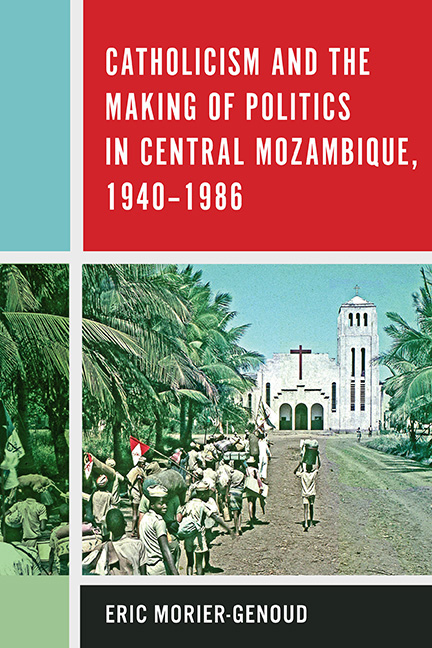Book contents
- Frontmatter
- Dedication
- Contents
- List of Illustrations
- Acknowledgments
- Note on Translations
- List of Abbreviations
- Introduction
- 1 The Making of the Diocese of Beira
- 2 Diversity and Dynamics of the Imperial Church
- 3 The Formation of an African Church
- 4 Gathering Storm: Vatican II Meets African Nationalism
- 5 Decolonization? War, Implosion, and the Vatican
- 6 Independence: Revolution and Counterrevolution
- Epilogue
- Notes
- Bibliography
- Index
4 - Gathering Storm: Vatican II Meets African Nationalism
Published online by Cambridge University Press: 28 June 2019
- Frontmatter
- Dedication
- Contents
- List of Illustrations
- Acknowledgments
- Note on Translations
- List of Abbreviations
- Introduction
- 1 The Making of the Diocese of Beira
- 2 Diversity and Dynamics of the Imperial Church
- 3 The Formation of an African Church
- 4 Gathering Storm: Vatican II Meets African Nationalism
- 5 Decolonization? War, Implosion, and the Vatican
- 6 Independence: Revolution and Counterrevolution
- Epilogue
- Notes
- Bibliography
- Index
Summary
The year 1958 is a turning point, in Mozambique, in Portugal, and internationally. The Non-Aligned Movement, formed in 1956 as an association of countries attempting to stand outside the power fields of the Cold War, brought the case of the Portuguese colonies to the attention of the General Assembly of the United Nations for the first time in 1957. In the following years, various African countries (some of them neighbors of Mozambique) were granted independence while, for a short while, the US government dropped its policy of supporting Portugal's colonial rule. Within Portugal, profound changes were taking place too. When an opposition candidate gained unprecedented support in the 1958 presidential elections, Salazar manipulated the polls to stay in power, strongly undermining his legitimacy. The regime was shaken and felt under pressure to introduce social, political, and religious reforms to respond to both these internal and external challenges. In Mozambique's neighboring territories, African nationalist movements began emerging in the late 1950s; by the mid-1960s they had entered into armed struggles. Finally, in the religious sphere, major changes came when the College of Cardinals in the Vatican elected John XXIII to succeed the late Pope Pius XII in 1958. Within a year, Pope John announced the holding of the Second Ecumenical Council of the Vatican (Vatican II) to examine the position of the Catholic Church in the modern world. The council opened in 1962 and lasted until late 1965, unleashing a new dynamic in the Catholic world.
This chapter and chapter 5 examine in detail how these significant changes affected the politics of the Catholic Church and its constituent parts in Mozambique, this chapter focusing on the years from 1958 to 1969 and chapter 5 looking at the period 1967–74. This chapter examines in detail how the religious orders in Mozambique and the bishop of Beira related to the developments of Vatican II, how African nationalism developed in central Mozambique, and how the church in the Diocese of Beira and in Mozambique more generally reacted to the rise of African nationalism. The aim is to understand how nationalism and Vatican II affected the church, and how, in turn, the religious orders and the bishop of Beira positioned themselves in relation to the tectonic changes unfolding in their territory and in the church.
- Type
- Chapter
- Information
- Publisher: Boydell & BrewerPrint publication year: 2019



